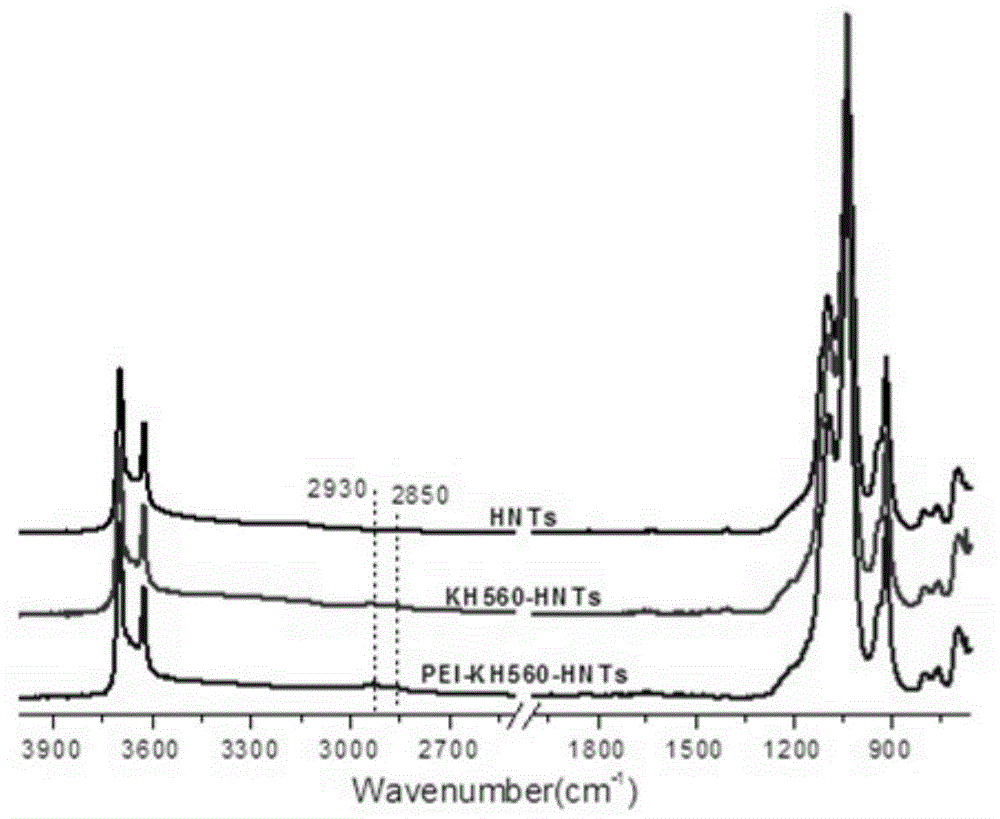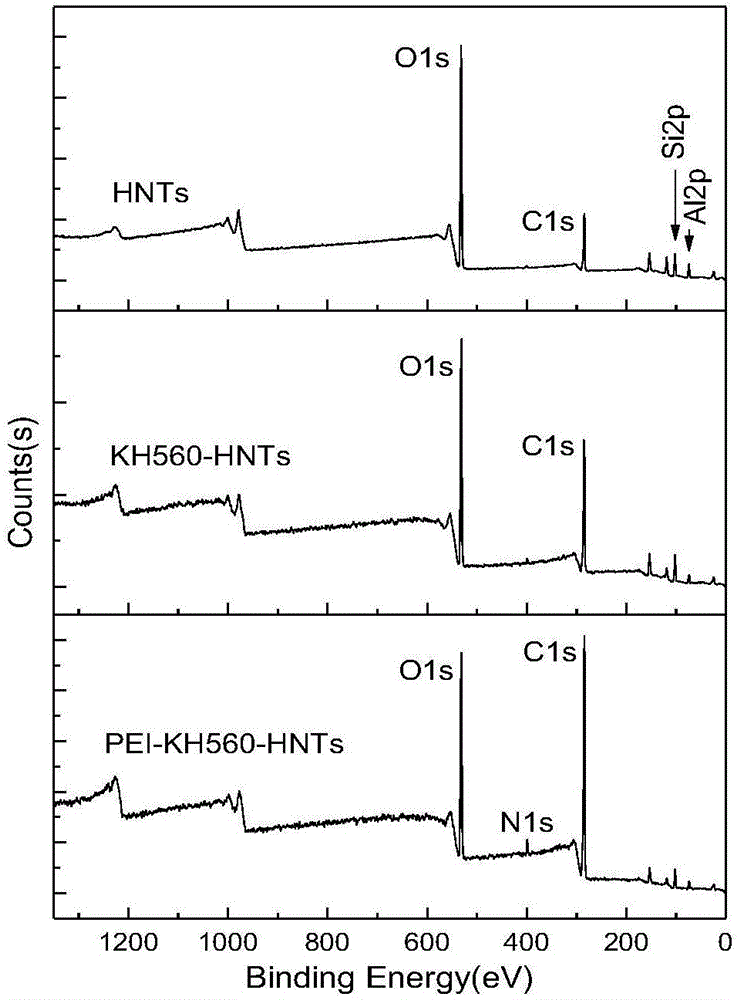Halloysite nanotube / epoxy nanocomposite
A technology of halloysite nanotubes and nanocomposites, which is applied in the field of halloysite nanotubes/epoxy resin nanocomposites to achieve good practical value, enhance interface interaction, and improve mechanical properties
- Summary
- Abstract
- Description
- Claims
- Application Information
AI Technical Summary
Problems solved by technology
Method used
Image
Examples
Embodiment 1
[0051] (1) Acidification of halloysite nanotubes: mix halloysite nanotube particles with 1mol / L hydrochloric acid solution at a mass ratio of 1:20, ultrasonically disperse for 60 minutes, stir for 4 hours, centrifuge, filter, and wash with water until medium properties, acidified halloysite nanotubes were obtained after drying at 110°C for 2 hours;
[0052] (2) Surface modification of halloysite nanotubes by silane coupling agent: prepare a homogeneous suspension with acidified halloysite nanotubes and toluene at a mass ratio of 1:50, and continue ultrasonic treatment for 30 minutes. Add dropwise γ-glycidyl etheroxypropyltrimethoxysilane (KH560) with 20% mass of acidified halloysite nanotubes, and stir and react at 120°C for 4 hours; after the reaction, filter, wash, and dry to obtain surface-modified Halloysite nanotubes with epoxy groups (KH560-HNTs);
[0053] (3) Branched polyethyleneimine grafted halloysite nanotubes: the epoxy group-modified halloysite nanotubes obtained i...
Embodiment 2
[0066] (1) Acidification of halloysite nanotubes: Mix halloysite nanotube particles with 2mol / L sulfuric acid solution at a mass ratio of 1:30, ultrasonically disperse for 30 minutes, stir for 12 hours, centrifuge, filter, and wash with water until neutral ; Import the washed product into a clean container, and dry at 100°C for 3 hours to obtain acidified halloysite nanotubes;
[0067] (2) Surface modification of halloysite nanotubes by silane coupling agent: take halloysite nanotubes by weighing, add 20 times the mass of acetone solution, ultrasonic treatment for 30 minutes; -(3,4-epoxycyclohexyl)ethyltrimethoxysilane (A-186), continue ultrasonic stirring for 30 minutes, add sodium hydroxide solution to make the pH of the mixture neutral, and react at 70°C for 5 hour; after the reaction finishes, filter, wash, dry, obtain the halloysite nanotube that the surface is modified with epoxy group;
[0068] (3) Branched polyethyleneimine grafted halloysite nanotubes: ultrasonically...
Embodiment 3
[0076] (1) Acidification of halloysite nanotubes: halloysite nanotube particles are mixed with 30% hydrogen peroxide at a mass ratio of 1:10, ultrasonically dispersed for 45 minutes to obtain a uniformly dispersed system; transferred to 80°C and stirred for 48 hours, Centrifuge, filter, wash with water until neutral, and dry at 110°C for 2.5 hours to obtain acidified halloysite nanotubes;
[0077] (2) Surface modification of halloysite nanotubes by silane coupling agent: Weigh acidified halloysite nanotubes, add 10 times the mass of ethanol solution (volume ratio of ethanol to water is 95 / 5), and continue ultrasonic treatment for 45 minutes ; The pH value of the solution is adjusted to 4 to 5 with dilute hydrochloric acid, and γ-glycidyl etheroxypropylmethyldimethoxysilane (AC-661) of acidified halloysite nanotube quality 50% is added dropwise, at 80°C The reaction was stirred for 24 hours. After the reaction is finished, filter, wash, and dry to obtain halloysite nanotubes w...
PUM
| Property | Measurement | Unit |
|---|---|---|
| Impact strength | aaaaa | aaaaa |
| Impact strength | aaaaa | aaaaa |
| Impact strength | aaaaa | aaaaa |
Abstract
Description
Claims
Application Information
 Login to View More
Login to View More - R&D
- Intellectual Property
- Life Sciences
- Materials
- Tech Scout
- Unparalleled Data Quality
- Higher Quality Content
- 60% Fewer Hallucinations
Browse by: Latest US Patents, China's latest patents, Technical Efficacy Thesaurus, Application Domain, Technology Topic, Popular Technical Reports.
© 2025 PatSnap. All rights reserved.Legal|Privacy policy|Modern Slavery Act Transparency Statement|Sitemap|About US| Contact US: help@patsnap.com



